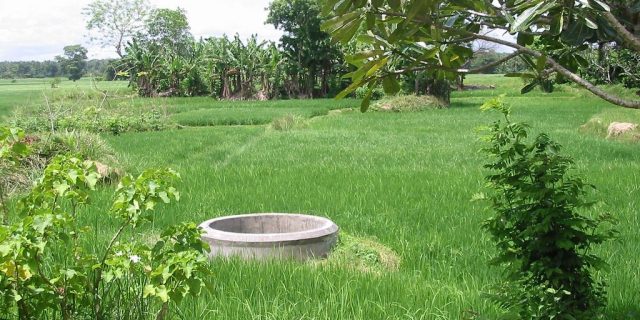12
Jan
Banned Pesticides in Well Water Linked to Declines in Kidney Function

(Beyond Pesticides, January 12, 2022) Well water in agricultural regions of Sri Lanka is contaminated with highly hazardous insecticides and associated with a decline in kidney function, according to research published in npj Clean Water this month. This finding is the latest piece in an ongoing ‘puzzle’ regarding the epidemic of chronic kidney disease of unknown origins in Sri Lanka and other developing countries in agricultural regions. Although the exact etiology of the disease has not been confirmed, a number of scientific studies have pointed the finger at industrial agriculture, increasingly finding evidence of chronic pesticide exposure in affected populations.
To better understand the connection between agrichemical exposure and kidney health, researchers enrolled 293 individuals from Wilgamuwa, Sri Lanka into a prospective study. Baseline data was retrieved on occupational and environmental exposure factors, focusing in on the water source individuals used at their homes. Samples of each participant’s household wells were taken and analyzed for the presence of pesticides.
Of the wells sampled, 68% were found to contain pesticides. Further, every well where pesticides were detected had at least one pesticide recorded above global drinking water guidelines. The chemicals found were also some of the most toxic pesticides to ever be sold, including the organochlorine insecticides DDT/DDE, propanil, and endosulfan, and the organophosphate diazinon. None of these chemicals are permitted for use in Europe or the United States, and some like endosulfan are being phased out globally through the Stockholm Convention.
The study found that individuals reporting drinking well water during their lifetimes had glomerular filtration rate (a measurement of kidney health) that was significantly lower on average (6.7) than other individuals who never drank well water, after accounting for differences in age and sex. Although this study does not reveal causation, it provides strong evidence that water contamination is playing a role in the development of the disease. “It is likely that there is no single compound of concern but rather a multiple stressor interactor effect across environmental and agrochemical exposure, behavior, and clinical factors,” the study reads.
Prior research has found a range of chemicals linked to kidney damage. Even among the 40 most commonly used lawn care pesticides, the vast majority – 32, are associated with damage to the kidney or liver. This includes widely used herbicides like glyphosate. In 2019, researchers Sararath Guanatilake, MD, and Channa Jayasumana, PhD, were awarded the Freedom and Responsibility Award from the American Association of the Advancement of Science for their work uncovering the link between glyphosate and chronic kidney disease. The award came as the two scientists had to defend their research from death threats and claims of misconduct directly or indirectly from the agrichemical industry, Bayer/Monsanto in particular. In fact, after receiving the award, Bayer/Monsanto bullying caused AAAS to withdraw the prize and place the award under review. Ultimately, however, after a multi-month pause, AAAS decided to confirm the original award.
Another pesticide, malathion, has recently been cited for its close link to kidney damage. A study published in October 2021 found significant associations with malathion exposure, low kidney function, and increased risk of CKD. With researchers now finding evidence that pesticide-contaminated well water may be a source of kidney dysfunction, it is evident that more action should be taken to protect those in intensive agricultural areas from pesticide exposure. While there is a desire to neatly separate bad from good actors in environmental ‘mysteries,’ including chronic kidney disease and the ongoing decline of pollinators, it is evident that in a world awash in chemicals, it is a combination of these factors that is likely at play.
We must act both locally and globally to shift away from our toxic reliance on hazardous chemicals to grow food we know can be grown without these chemicals. Sri Lanka’s government recognized this and attempted to rapidly transition the country to more organic agriculture. However, reports indicate that the approach taken simply stopped government subsidizes for chemical pesticides and fertilizers, without widespread education on new practices or support for alternative products. (There is further indication that this decision was in part a response to lost tourism dollars from the Covid pandemic.) Organic agriculture is about more than removing toxic pesticides and chemicals; it is a systems-based approach that reorients crop production and pest management towards soil health, increased diversity, and working with, rather than against, natural processes. While Sri Lanka’s dive into organic was not successful in this initial attempt, more and more farmers are now aware of the dangers and the need transition to safer practices. Major changes rarely occur successfully at all once, but are often the result of many trials, eventually embracing new approaches once education and practices are further developed. As the present study shows, Sri Lanka’s work to reduce and eliminate toxic chemical use is important for its citizen’s health; with hope the country will learn from its mistakes and continue efforts to increase adoption of organic agriculture.
For more information about the dangers of pesticides in drinking water, see Beyond Pesticides Contaminated Waters program page. Additional information on the link between pesticides and kidney disease can be found on the Pesticide Induced Diseases Database.
All unattributed positions and opinions in this piece are those of Beyond Pesticides.
Source: npj Clean Water
Image: Flikr










